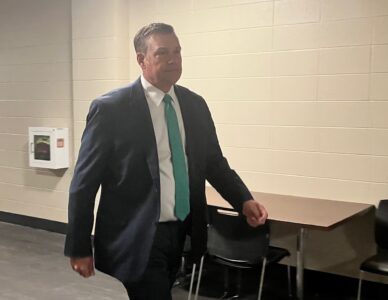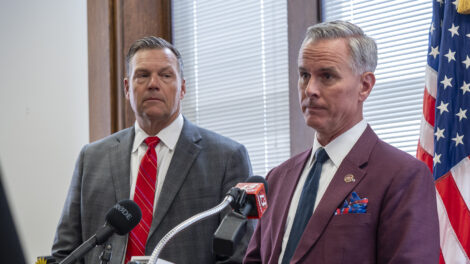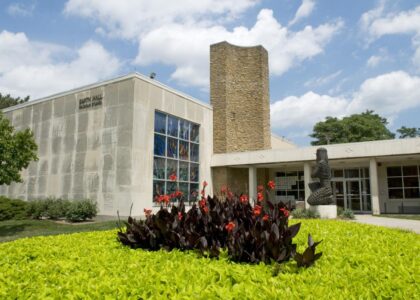Water experts and lawmakers join forces in new task force to tackle Kansas water challenges

photo by: David Condos/Kansas News Service
A center pivot irrigation sprinkler sprays water onto crops in Finney County. Center pivot irrigation is a popular irrigation method in Kansas, but it applies water at a high rate.
A new Kansas water task force, made up of experts and leaders from across the state, is set to tackle the state’s most urgent water issues.
The Kansas Water Program Task Force – which was created from House Bill 2172 – will develop a long-term, sustainable water plan for the state, including a dedicated funding source, similar to the state’s transportation programs. The task force will have 16 members of Republican and Democratic legislators, state officials and has a handful of appointees from both parties.
The task force is closely aligned with the Kansas Water Plan Implementation Framework developed by the Kansas Water Office, which was finalized in December. The framework was created to provide a clear, actionable strategy for addressing the state’s growing water challenges.
Both the bill and the framework share common goals: assessing the risks to the state’s water supply, identifying steps to secure future water quality and quantity, and evaluating the adequacy of funding for current and future infrastructure needs. The task force’s findings will help shape legislation and support investment decisions for long-term water security.
The task force will begin providing recommendations with a preliminary report that will be presented by the end of January, and will end with a final report that must be submitted to the governor along with the Kansas legislature by the end of January 2027.
At the beginning of May, Republicans appointed Jared Morrison, director of Evergy’s water and waste programs; Kansas Chamber board chair Karma Mason; and Shannon Kenyon, the manager of Groundwater Management District No. 4 in northwest Kansas. In addition, Democratic leadership appointed Josh Svaty, a former state legislator and former state agriculture secretary, and Heidi Mehl, the Kansas director of water and agriculture for the Nature Conservancy.
Svaty said he thinks there are two things that make this task force particularly intriguing.
“One is the state’s overall focus on water,” Svaty said. “I think (it) has only increased in the last six to seven years, both from droughts, but also I think a growing awareness by all members of Kansas, of just how important water is to our economy and to our ability to live here and raise a family here.”
“I think the other reason that this task force in particular is going to be interesting is because it’s much smaller, and it is driven by legislatures who have been briefed on a lot of these issues, and so I think this task force will hit the ground running.”
Svaty previously served on the Kansas House of Representatives for multiple terms before becoming Secretary of Agriculture of Kansas during the Gov. Mark Parkinson Administration. Svaty also worked at the Environmental Protection Agency in the Region 7 office, where he dealt with a lot of water quality issues.
“So I got to see both sides of the coin,” Svaty said.
Now, Svaty works with his wife, Kimberly, who’s the CEO of Gencur Svaty Public Affairs, where they have worked to represent the Kansas municipal utilities around the state for more than 17 years, he said.
“The municipal utilities have interests in both quantity and quality issues, and a lot of the issues that have been tackled, or at least began to be tackled, (have been) by the investments that the Legislature and the governor have made into the water fund in the past couple of legislative sessions,” he said.
“And we’ve been right in the middle of those conversations,” Svaty added.
Mehl told the Journal-World in an email that the state’s most urgent water concern is the alteration of the natural hydrologic cycle which provides the quantity and quality of water Kansans have relied on for generations. She said substantial concerns like groundwater depletion and reservoir management affect distinct parts of the state in various ways but, like most of our water issues, they are exacerbated by changes to our natural hydrologic cycle.
“My greatest hope is that this task force won’t shy away from bold action,” Mehl said via email. “We cannot keep doing ‘business as usual’ or make small changes and expect a different result … The state has an opportunity to facilitate broader adoption of these practices, in agricultural, industrial, and urban/suburban settings. It will take everybody working together.”
She was hired by the Nature Conservancy in 2016 to build the David T. Beals Healthy Streams for Kansas Initiative, established to improve water quality and water security across Kansas. She has also worked with the agricultural community and U.S. Fish & Wildlife Service in Rattlesnake Creek on solutions to improve water use efficiency and remove invasive trees from the area.
Mehl said she has built partnerships with federal and state agencies, including the Kansas Water Office, to identify opportunities to use dam releases to improve downstream river ecosystems and water quality. She has also recently stepped into a new role with The Nature Conservancy, where she will be guiding freshwater conservation strategies for the entire 10-state Great Plains Division.
Other members of the task force include non-voting members, such as the director of the Bureau of Water within the Division of Environment at the Kansas Department of Health and Environment, which is currently Tom Stiles. Two other non-voting members include Connie Owen, director of the Kansas Water Office, and Earl Lewis, chief engineer of the Kansas Department of Agriculture’s Division of Water Resources.
Mehl said via email that she is honored and humbled to be appointed to the task force.
“The entire task force is comprised of folks who are well versed in the water challenges facing Kansas and committed to finding practical, long-term solutions,” Mehl said, “and I am excited to serve with them.”
The Journal-World reached out to all appointees for the task force, but the rest did not respond. Kenyon told the Journal-World via email that as the water task force has not met yet, she does not have any opinions on the subject at this time and is not committing to interview requests.
Within the next two months, the members of the task force will have to appoint people to a subgroup that will be responsible for modernizing the State Water Resources Planning Act – providing the framework for comprehensive water resources planning within the state.
According to the legislation, the members of the subgroup will have to be attorneys, engineers, hydrologists, natural resource planners or others with experience with Kansas water issues.






